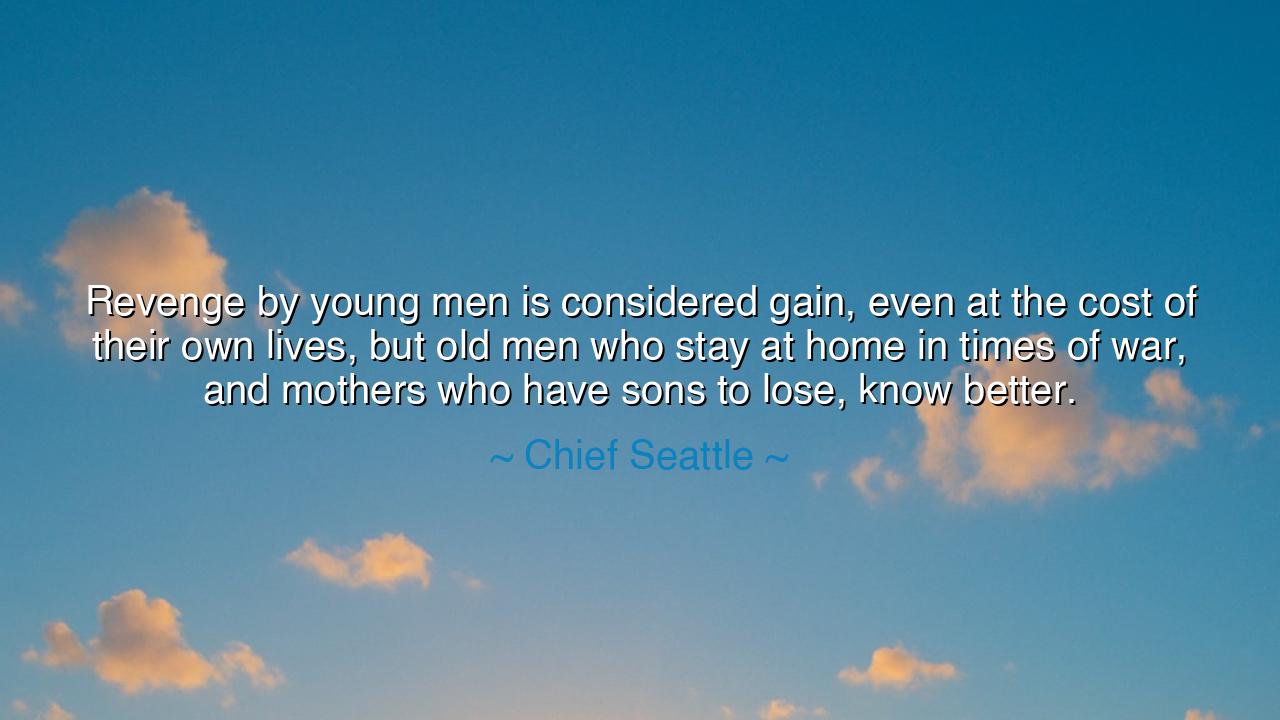
Revenge by young men is considered gain, even at the cost of
Revenge by young men is considered gain, even at the cost of their own lives, but old men who stay at home in times of war, and mothers who have sons to lose, know better.






In the voice of Chief Seattle, the wise leader of the Suquamish and Duwamish peoples, we hear a truth that cuts across centuries and civilizations: “Revenge by young men is considered gain, even at the cost of their own lives, but old men who stay at home in times of war, and mothers who have sons to lose, know better.” These are not the words of weakness, but of vision—born of sorrow, carved from the deep understanding that time gives to those who have lived through both conflict and loss. It is a meditation on the difference between passion and wisdom, between the fire of youth and the enduring ache of experience.
When Chief Seattle spoke these words, his world was one trembling beneath the weight of change. The lands of his ancestors were being seized, his people displaced, their traditions fractured by the march of empire. He had seen the fury that rose among his young warriors—the yearning to strike back, to reclaim honor with blood. But in his heart, he knew that vengeance, though fierce and intoxicating, feeds only the hunger of destruction. He had seen how wars begin in righteousness and end in ruin, how the price of anger is always paid in the tears of the old and the grief of mothers. Thus, his words were both a lament and a warning: that revenge, though it may glitter with the illusion of victory, is a false gain, a shadow that consumes those who chase it.
In the ancient way of things, young men have always been the fire of their people—the swift hands, the brave hearts, the ones who run toward danger while others weep or wait. To them, the clash of battle feels like purpose, and the cry for vengeance like justice. But to the old men who have watched too many dawns after too many funerals, and to the mothers whose arms grow empty while the drums of war still beat, the truth is different. They see not glory, but loss; not triumph, but the breaking of futures. Their wisdom is born of grief, of knowing that the wound left by revenge does not heal—it only deepens through generations.
The ancient world is full of stories that echo Chief Seattle’s wisdom. In the Iliad, Achilles sought revenge for the death of his friend Patroclus. His wrath burned brighter than the sun, and he slew Hector, the prince of Troy. Yet when Achilles stood over Hector’s body, his triumph turned hollow. He had avenged his friend, yes—but in that victory, he found no peace. The gods themselves turned away from his fury. Achilles learned, as every warrior must, that revenge consumes the avenger, and that no life taken can restore the one lost.
So too did the elders of many tribes, nations, and kingdoms learn to speak with restraint, even when wronged. The old men who stay at home and the mothers who have sons to lose understand a sacred truth—that the continuation of life is a greater victory than the satisfaction of vengeance. They see that to answer hatred with hatred is to let the fire of destruction spread until it devours all. Only those who have watched their people fall into the grave of endless conflict know how bitter the fruit of revenge truly is. They know that peace, though harder to build, nourishes the soul where vengeance poisons it.
The origin of this quote lies in Chief Seattle’s legendary speech, delivered in the mid-nineteenth century, as his people faced displacement by the expanding United States. It was a moment when the clash between worlds—between the indigenous and the imperial—forced humanity to confront its own contradictions. Seattle’s wisdom was that of a leader who saw beyond the rage of the moment. He knew that survival, not retaliation, was the greater act of strength; that preserving one’s people, one’s culture, one’s spirit, was a form of courage more lasting than the blade of any warrior.
Let the lesson be carried into every age: do not mistake vengeance for justice, nor anger for strength. The young will always hear the call to fight, but let them also hear the whisper of the elders, who know the cost. There is courage in restraint, heroism in forgiveness, and power in patience. Those who seek revenge see only the present wound; those who seek peace see the generations yet to come.
So, children of the future, when the fires of anger rise in your heart, remember the wisdom of Chief Seattle. Remember that life is sacred, and that the greatest victory is not to destroy one’s enemies, but to prevent one’s children from inheriting the same hatred. The warriors of tomorrow must learn the deepest form of strength—the strength to break the cycle of vengeance. For peace, once built, is the most enduring revenge against the darkness that once sought to consume the world.






AAdministratorAdministrator
Welcome, honored guests. Please leave a comment, we will respond soon